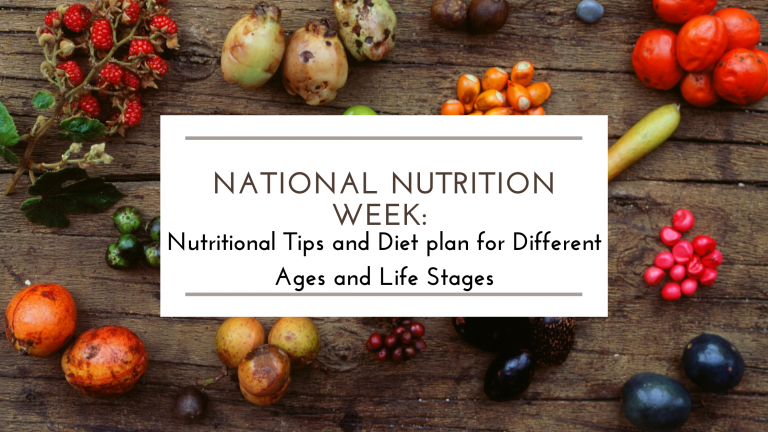Our dietary requirements fluctuate as we move through different life stages, from infants to the elderly. It’s essential to consider the additional demands set on your body by these changes to stay active and healthy. A child prefers brighter colors on plates with small servings, whereas an older adult with weaker teeth requires a softer, nutrient-dense diet. Expectant mothers have different dietary needs than women of the same age group. They need more nutrients, for their growing child inside.
What you eat every day has an impact on your well-being. Here are a few pointers to remember while you think about your next meal-
- A home-cooked balanced diet is the best nutrition source.
- Prefer to add essential monounsaturated fats like Omega 3,6 and 9 to your daily diet.
- Make sure you eat sufficient protein food for cell repair and maintenance.
- Fat-soluble and water-soluble vitamins from green leafy vegetables, liver, butter, and egg yolks.
- Plant-based phytochemicals, which may protect the heart, diabetes, arthritis, and osteoporosis, are present in vegetables, fruits, cocoa, and green tea.
- Food groups that are rich in minerals such as iron, calcium, and zinc.
| National Nutrition Week At every step of the human cycle, nutrition protects our health and well-being. Nutrition has a critical role in the quality and longevity of a person’s life cycle. However, a person’s nutritional requirements differ at life stages. The first week of September i.e. from 1st- 7th is National Nutritional Week for India. This week aims to spread awareness about the importance of nutrition to one’s wellbeing. This year’s theme is “feeding smart from the start.” |
Nutritional Tips and Diet plan for different Life Stages
To commemorate National Nutrition week 2021, we at Gigadocs have compiled unique dietary requirements that match life stages and diverse age groups. Read on and check to see if you’re eating adequately for your age and nutritional needs.
Nutrition for Pregnant Women
During the first and second trimesters, a pregnant lady should focus on increasing her food intake. Expectant mothers gain 10 to 13 kg on average during their pregnancy- which, however, is dependent on the pregnant woman’s pre-pregnancy weight. Take a look at these diet suggestions for expecting mothers. –
- There is no such thing as ‘eating for two,’ resulting in excessive weight gain. A healthy pregnancy requires only an additional 1,400 to 1,900 kilojoules per day throughout the second and third trimesters.
- Focus on the quality of your nutrition rather than the quantity.
- Indulge in carvings but don’t allow them to take the place of more healthy alternatives.
- Folate, iron, vitamin B12, and iodine are among the nutrients demanded the most during pregnancy.
- Iron is essential for the transfer of oxygen throughout the body. Besides, increasing vitamin C consumption will help expectant mothers absorb more iron from their food.
- Folate is essential three months before and during pregnancy to prevent neural tube abnormalities (spina bifida) in the newborn. All pregnant women should consume high-folate foods (such as green leafy vegetables, fruits, and legumes).
- The suggested calcium intake does not change throughout pregnancy. However, pregnant ladies must achieve their calcium levels during their pregnancy.
- Drink a lot of water.
- Say no to alcohol- both direct and passive smoking may lead to stunted growth, pregnancy complications, perinatal mortality, placental problems, and low baby birth weight.
Nutrition for Breastfeeding Mothers
A nursing mother’s diet requires a large amount of excess energy. Nutrient-dense foods help them fulfill the additional nutritional needs that arise with breastfeeding. Here are a few-
- Pregnant women must consume nutrient-dense foods, particularly those high in folate, iodine, zinc, and calcium.
- Breastfeeding can trigger fatigue, dehydration, and constipation. Thus, pregnant women must not miss their glass of water.
Nutrition for a Child
It can be challenging to get a balanced diet for children because they can be picky eaters. However, a child’s meals can be made more flavorful by including nutrients in a visually appealing presentation, like a multicolor vegetable fruit sandwich.
The physical, social, and developmental changes are rapid during childhood. Because the child is growing, he/she requires protein and essential fatty acids, that aid in brain development. As the kids enter adolescence, mothers must supplement their food with vital minerals such as calcium, phosphorus, magnesium, and zinc that aid in overall development.
Nutrition for Teens
As children enter puberty (girls between the ages of ten and eleven and boys in their early teens), they demand nutrients, proteins, iron, and minerals. This age group requires nutrient-dense meals, including wholegrain bread and cereals, fruits, legumes, nuts, vegetables, seafood, and lean meats.
- Parents must add milk, yogurt, and cheese (mainly low fat) to a youngster’s diet to increase calcium absorption- this is especially necessary for growing bones.
- Adolescent girls must be encouraged to consume milk and milk products regularly.
Nutrition for the 20-40 Age Group
Adult nutrition highlights the significance of eating nutritious for a healthy body and keeping diseases at bay. 20-40 age groups have different nutritional intakes for males and females. Females planning a family need more iron, vitamins, and minerals on their plates.
Nutrition for the 40-60 Age Group
The age of 40 is the perfect time to reach the correct balance. It’s a moment of transition, and nutritional needs shift as metabolism shifts. People in this age group must ensure that they retain good health by including strong phytonutrients and antioxidants in their diet, that improve digestion and strengthen immune systems.
This age group is at risk for osteoporosis, high blood pressure, mood swings, and heart disease due to hormonal changes. Iron-rich foods like nuts are excellent sources of healthy fatty acids like Omega 3, besides avocado, berries, and green leafy vegetables also help relieve the early onset symptoms.
Nutrition for Menopausal Women
Postmenopausal women often experience bone thinning because of hormonal changes. Here are a few diets and nutritional food suggestions for women approaching menopause-
- Consume calcium-rich foods.
- A high-fiber, low-fat, and low-salt diet helps alleviate numerous menopause symptoms, including hot flushes. Chickpeas, lentils, and cracked wheat are all good food sources (Dalia) that they can consider.
- Whole grains, legumes, fruits and vegetables, and low-fat dairy products are among the nutrient-dense foods that women approaching menopause must include in their diet.
- Weight-bearing exercises, such as walking or weight training, can help maintain healthy body weight and build bones.
Nutrition for Elderly (60 and above)
Older adults’ diets should be nutrient-dense, as this is the age when a person’s physique begins to deteriorate, and they are unable to conduct daily activities as well as they once could. Some elderly may be unable to prepare their meals independently or may be unable to chew or swallow food properly due to dental problems, not to forget the digestive concerns that may affect their eating habits.
- Eggs, lean meats, fish, liver, low-fat dairy foods, nuts and seeds, legumes, fruit and vegetables, wholegrain bread, and cereals are examples of nutrient-dense foods rather than energy-dense ones for the elderly.
- They must avoid high energy but low in nutrition food items like cakes, sweet biscuits, and soft drinks.
- The elderly must have fiber-rich food on their plate that promotes gut health.
- Table salt should be used sparingly, especially when cooking for seniors.
- Seniors must spend some time outside each day, if possible, to increase their vitamin D synthesis and maintain healthy bones.
Diet and Health Consultation with Gigadocs
Gigadocs wishes all its patrons a Happy and Healthy Nutrition Week.
We believe a balanced meal taken at the correct timings goes a long way in maintaining a healthy body and soul. We bring our audience and patrons teleconsultation facilities for all their chronic and non-chronic diseases, which they can avail themselves of from the comfort of their homes at their convenient timings.
Download the Gigadocs app to consult the best doctors around you, manage your health and well-being with Gigadocs-
- IOS App – apple.co/2W2iG4V
- Android App – bit.ly/33AQoRC
To schedule a demo e-mail, at info@gigadocs.com




